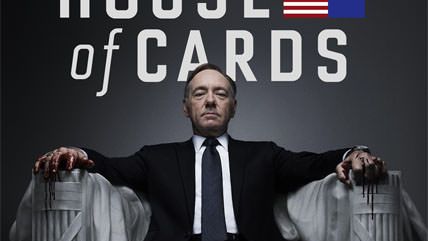The Unrealism of House of Cards

The second season of Netflix's House of Cards follows Vice President Francis Underwood as he continues his political ascent, powered by the same sociopathic drive featured in season one. The season also includes stories about his wife, the president he seeks to topple, and the journalist who hopes to reveal Underwood's darkest secret. There's a lot that will be familiar to devotees of political drama: thinly veiled allusions to real-world crises, the sausage-making legislative process, and the paranoia haunting high office.
House of Cards works as juicy drama, but it is hard to imagine any actual politician being competent enough to execute as many schemes as the devilish Underwood without exposure or widespread public suspicion. Suspension of disbelief is required, but well worth it.
Editor's Note: As of February 29, 2024, commenting privileges on reason.com posts are limited to Reason Plus subscribers. Past commenters are grandfathered in for a temporary period. Subscribe here to preserve your ability to comment. Your Reason Plus subscription also gives you an ad-free version of reason.com, along with full access to the digital edition and archives of Reason magazine. We request that comments be civil and on-topic. We do not moderate or assume any responsibility for comments, which are owned by the readers who post them. Comments do not represent the views of reason.com or Reason Foundation. We reserve the right to delete any comment and ban commenters for any reason at any time. Comments may only be edited within 5 minutes of posting. Report abuses.
Please to post comments


House of Cards is awful in that pure evil should never be that sexy! The Kevin Spacey character had not a single redeeming quality and yet he was mesmerizing. And I have to admit I cheered a bit inside when he beat the Teacher's Union rep.
drama, but it is hard to imagine any actual politician being